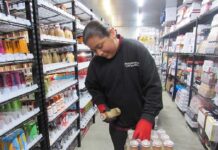
Soboba Band of Luiseño Indians
Special to the Valley News
The Soboba Tribal TANF Program hosted its annual Honoring Ceremony and Traditional Family Gathering at the Soboba Springs Golf Course Friday, Dec. 15. A welcome and blessing was followed by a buffet dinner featuring many delicious options such as braised short ribs, roasted turkey and dressing and winter salad. The Inter-Tribal Bird Singers performed a few well-received songs before keynote speaker Judge Sunshine Sykes addressed the audience with her inspiring and heartfelt words.
With miniature Christmas trees as centerpieces, families from all TANF sites gathered at dinner tables to enjoy good food and great company. Along with members from the Soboba site, others from the Riverside, Cahuilla and Santa Rosa TANF sites were in attendance. William Ramirez, who served as master of ceremonies, introduced guests and oversaw the many raffle prizes available.
The youngest children were given an opportunity to spend time in an arts and crafts room during Sykes’ speech. They made last-minute gifts for their friends and family such as decorative frames to be used for holiday photos and more. TANF staff supervised while Christmas music played, and children got to use all the glitter and stickers they wanted to create their crafts.
Sykes, who is a U.S. District Court judge appointed by President Joe Biden in 2022, is a member of the Navajo Nation and serves in Riverside. Before being a federal judge, she was a state court judge, also in Riverside. Between law school and becoming a judge, she worked with Tribes and Tribal members on issues affecting Indian people and Natives.
“It’s been great being here with you today and seeing all the happiness, love and joy that is within this room and all the successes from all of you here,” Sykes said. “As many of you know, California has the largest Native population in the country and a number of these Tribes are found right here in Riverside County, yet it took until 2013 to have a Native American judge on the state court bench. It took until 2022 for the federal court to have a Native American judge in the entire state of California. My appointments to both the state and the federal court were historic. I was the first in each of those spaces. The first Native seated at a table that had historically never welcomed nor invited a Native to sit. And I mention this to demonstrate how much further we need to go to have equal representation in these spaces. There are many of these spaces across the country in many careers and we can only achieve a seat at these tables through education, determination and resilience. All of these have been a large part of my journey to be able to stand here before you all.”
She shared that her maternal grandmother and paternal grandfather grew up on the Navajo reservation, each being the first in their family to speak English and attend any type of school.
“My great-grandmother spoke no English and herded sheep, living in a small hogan with no electricity and no running water,” Sykes said. “They lived their lives traditionally until they were forced to attend Sherman Indian Institute which ironically was just a few miles away from my courthouse in Riverside.”
Her grandfather had told her how he was taken from his home, forced to cut his hair, forced to not speak his native language and forced to march to and from classes. But despite such trauma, she said her grandparents made a life for themselves and for her mother.
“My mother and father also grew up on the Navajo reservation and although they had me at quite a young age, they were both 17, they were still able to graduate high school and go onto college and get their bachelor’s and master’s degrees,” she said. “So it is possible to go to college and have children and make it through.”
Sykes had her first of four daughters while she was attending law school and admits it was a lot of work but doable.
“Unfortunately, my parents divorced when I was six and my mother traveled with me to Washington, D.C., to begin a career at the Bureau of Indian Affairs,” she said.
Her mother was relocated to Gallup, New Mexico, and Sykes said growing up there caused her to see many injustices.
“Gallup is a border town to the Navajo reservation, which like many other reservations, does not allow alcohol,” she said. “Due to this, Gallup has a lot of bars, alcoholism, poverty and racism.”
Sykes said it was those injustices that she saw and experienced that really drew her to the law and wanting to make a difference in the world, in her life and that of her family.
“So I decided to dedicate myself to my schooling to do the best that I could to get good grades,” she said.
She worked hard and attended Stanford University law school. She gave back to her community by working for legal services agencies before, during and after law school.
“I wanted to help Native families and children, so I focused on the Indian Child Welfare Act and developed that expertise that I was then able to share with members of the legal community, not only in the Inland Empire but across the state, training social workers and judges to make sure they understood the importance of the Act and that they were following the law,” she said.
It was all those experiences that led her to be appointed by former Gov. Jerry Brown to the state bench in 2013 and then last year to her appointment by Biden. Of the more than 800 federal judges in this country, Sykes is one of only five that are Native American.
“During these experiences, I’ve always tried to stay grounded and remember who I am and where I come from,” she said. “I tell you my story so that you can hopefully see the ways in which your choices in life can have a direct impact on your family and all those around you. By choosing to further your education, you will be bettering the lives of your family, your community, your Tribe and most importantly, yourself.”
She told the parents to encourage their children to be the best that they can be and told all the students that just by being in school, many have overcome tremendous odds. She said there are many barriers in today’s society that Native people still face in pursuing education.
“But those barriers can be broken,” Sykes said. “We see that all around us as Tribes and Tribal communities are controlling their own destinies through economic development, self-determination, traditions, ceremonies, language. As I look around this space and I see all your faces, I see hope for our future. Through hard work, dedication and courage, I know we all can attain whatever goals that we set our sights on today.”
She quoted Wilma Mankiller, the first woman elected to serve as Principal Chief of the Cherokee Nation, who was a community activist and organizer that helped establish education programs throughout Indian Country. Mankiller said the secret of the success of Native people is that “we never, never give up.”
Sykes said, “Each of us carries strength, courage, determination, resilience and the power to adapt. These are only some of the gifts given to us from our ancestors. The ability to rise above and never forget the sacrifices of our ancestors and all they had to endure for us to be here today. Remember that each and every one of us has power within us; don’t be afraid to stand in it.”
The heart of the event was recognizing the accomplishments of those program participants who have worked hard toward reaching their goals in 2023. Several agencies and companies that partner with TANF gave out specific awards to deserving individuals.
One of those was Sylvan Learning, which offers tutoring. They gave out certificates of achievement to eight students that the tutors felt did an outstanding job this year with setting and meeting goals.
Regional TANF manager Angela Diaz and case worker Neysa Malvaez recognized adults from the Riverside, Cahuilla and Santa Rosa sites who have shown significant progress. From single mothers who are full time students to veterans and single fathers, all have shown great effort this past year. Others, who have chosen to return to school to further their education, were also singled out for their hard work and dedication.
Regional prevention manager Harold Arres and senior program specialist Annalisa Tucker from Soboba Tribal TANF presented Youth Leadership awards to Zachary Guacheno and Abigail Arres.
Tucker said, “I’ve had the privilege of watching them both grow and mature during the years they’ve been with the program. I’ve been able to rely on them to help with younger members on trips and help bring up the younger generation. They are so helpful to us and we are so grateful to have them in our program.”
Advance Technical Institute, another service provider for TANF programs, acknowledged nearly 20 students who have excelled this past year.
“We gather here tonight to celebrate your journey and to applaud you on this wonderful accomplishment you have done, not just for yourself but for your family,” George Cajas, founder and director of ATI, said. “Embarking on the pursuit of education, particularly as adult learners, is a commendable and great choice. It’s a testament of your commitment to self-improvement and a clear indication of your belief and affirmation of the power of knowledge. Self-sufficiency, which is one of the TANF goals, is a quality you have developed and honed throughout your academic journey. It’s not just about standing on your own two feet but about processing and possessing the strength and wisdom to navigate through life’s challenges with confidence and grace. You have demonstrated that learning knows no boundaries and that there’s always time to invest in yourself. Your family’s values have played a critical role. Your family’s support, love and encouragement have been your backbone, giving you the strength to persevere when times are tough. Take the time to express your gratitude to those who have stood by you and are here with you tonight.”
Cajas introduced the 2023 TANF participants being recognized and receiving a $50 check “symbolizing our institute’s investment in your future success.” From those, three were chosen to receive the 2023 Student of the Year award.
“This award is a testament to the institute’s commitment to recognizing and encouraging academic excellence and leadership qualities,” Cajas said. “This recognition not only serves to commend the current successes of these outstanding students but also aims to inspire and motivate all participants that are here tonight at this honoring event to strive for excellence in their academic pursuits and careers. The Student of the Year awards are a foundation of our institute’s tradition, symbolizing its core values and commitment to fostering an environment where exceptional talent, hard work and ambition are recognized and celebrated.”
The Student of the Year award is more than just a title. Each honoree received a check for $250 and a framed certificate to serve as a reminder of their hard work and dedication in making significant contributions to their communities. This year’s recipients included Chris Jorge and Marggie Vargas.














